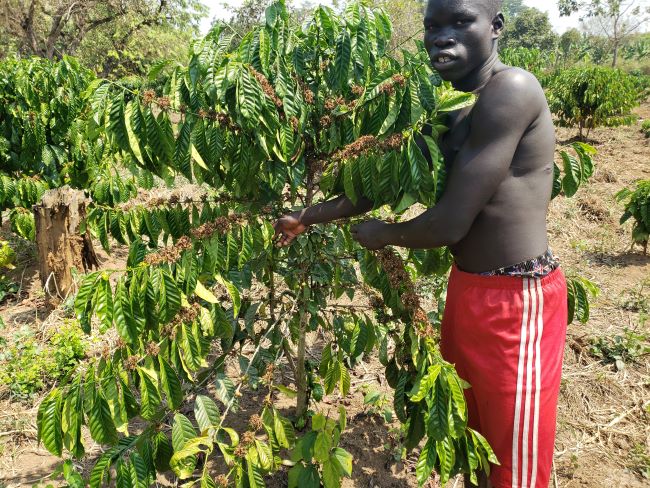ADJUMANI, January 21, 2025 – Over 200 small-scale farmers in Adjumani have ventured into coffee and cocoa cultivation, supported by the Ministry of Agriculture, Animal Industry, and Fisheries (MAAIF). These farmers are benefitting from government initiatives aimed at promoting the growth of these two key cash crops.
According to Charles Lagu, the District Agricultural Officer for Adjumani, since 2021, through Operation Wealth Creation [OWC] programme, government has been supplying agricultural inputs to willing farmers to encourage the cultivation of coffee and cocoa in the district.
Lagu revealed that in the 2022/2023 season, some farmers in the district sold 508 60-kilogramme bags of coffee, having been among the first to take part in the coffee-growing initiative introduced by the government.
“With this continued government support, we are expanding the programme, and this year, we expect to supply seeds covering 1,000 acres. We anticipate a 10 percent increase in yields this year,” Lagu said.
He added, “If all farmers embrace this practice, in five years, we could plant up to 10,000 acres, making Adjumani the best coffee-growing district in the country.”
Farmers share their success stories
Josephine Masudio, a model farmer with 4 acres of coffee and half an acre of cocoa, shared her success, noting that growing both crops could eradicate poverty and bring prosperity among the farming communities.
“This year, I plan to expand to 20 acres of both coffee and cocoa. From a single cocoa tree, I can earn about Shs 150,000. Last year, I sold 30 kilograms of coffee for Shs 150,000. This year, I expect to earn Shs 27 million from coffee alone,” Masudio said.
Masudio also hopes to develop her farm as a learning centre where other farmers can come to learn the best practices for growing coffee and cocoa.
Another model farmer, Patrick Rubangaku, began cultivating coffee in 2022. Although the initial costs were high, Rubangaku endured, and now his 4.5-acre farm is yielding results.
“Through the training, we were taught that each coffee tree can produce between 5-7 kilograms. My 4.5 acres could earn me Shs 10 million per season, and I plan to expand to 10 acres,” Rubangaku explained.
Forming cooperatives for better opportunities
Farmers in Adjumani have also come together to form coffee and cocoa cooperatives to enhance marketing and bargaining power. The District Commercial Officer Agnes Dipio praised this development, highlighting that cooperatives would enable farmers to negotiate better prices, improve product quality, and increase production volumes.
“For years, farmers have struggled due to a lack of collective bargaining power, which has allowed middlemen to exploit them. With cooperatives, farmers can now produce for export,” Dipio said.
Adjumani’s soil and climate favour coffee growing
Lagu confirmed that the soils in Adjumani, particularly in the southern belt, are ideal for coffee cultivation. While the northern part of the district is less favourable, it still offers some potential for coffee growing.
“We conduct soil tests before advising farmers to start coffee cultivation. Our analysis shows that the southern region is especially well-suited. If you enter the Zoka Central Forest Reserve, you’ll see coffee growing naturally,” Lagu explained.
The soil in Adjumani is well-drained, fertile, and slightly acidic, with a pH range of 5.5 to 6.5 – perfect for coffee plants, which thrive in such conditions. The soil is rich in organic matter, helping to retain moisture, suppress weeds, and provide essential nutrients to the coffee plants. Furthermore, the soil’s structure, with a mix of clay, silt, and sand, allows for good aeration and water infiltration.
Experts agree that with proper farming practices, adequate inputs, and good management, coffee farmers in Adjumani can produce high-quality coffee that meets international standards and commands a good price.
The coffee market
Masudio noted that both coffee and cocoa have readily available markets, adding that South Sudan and the Democratic Republic of Congo, are potential export destinations.
She urged other farmers to join cooperatives to tap into the available market within the East African Community. Adjumani district primarily grows Arabica coffee.
Lagu explained that coffee in the district is largely grown on smallholder farms, which contribute significantly to household incomes. However, farmers face challenges in accessing markets due to infrastructure limitations. He reassured, though, that initiatives to improve roads and export facilities are underway.
There is also a strong push towards value addition, with efforts to process coffee locally, allowing farmers to increase their profits.
Robert Obulejo, Chairperson of the Madi Coffee Cooperatives, explained that the coffee cooperatives in Adjumani will provide significant benefits to farmers, helping to improve their livelihoods.
“As a cooperative, we provide farmers with access to high-quality inputs, such as seeds, fertilisers, and equipment, at competitive prices, helping to reduce costs and increase productivity. We also connect our members to affordable credit facilities to finance their farming activities,” Obulejo said.
A Brighter future for Adjumani
With the combined efforts of the government, cooperatives, and individual farmers, coffee and cocoa farming in Adjumani is set to drive economic transformation. The district’s farmers are not only improving their incomes but are also contributing to environmental sustainability, positioning Adjumani as a leader in Uganda’s agricultural sector.
Buy your copy of thecooperator magazine from one of our country-wide vending points or an e-copy on emag.thecooperator.news
-
-
-
-
